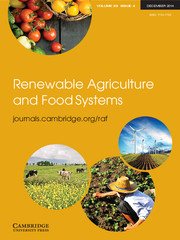Crossref Citations
This article has been cited by the following publications. This list is generated based on data provided by
Crossref.
Ding, Xiuling
Lu, Qian
Li, Lipeng
Sarkar, Apurbo
and
Li, Hua
2022.
Evaluating the Impact of Institutional Performance and Government Trust on Farmers’ Subjective Well-Being: A Case of Urban–Rural Welfare Gap Perception and Family Economic Status in Shaanxi, Sichuan and Anhui, China.
International Journal of Environmental Research and Public Health,
Vol. 20,
Issue. 1,
p.
710.
Kamau, Christopher N.
Majiwa, Eucabeth B.
Otieno, Geoffrey O.
and
Kabuage, Lucy W.
2023.
Intention to adopt improved indigenous chicken breeds among smallholder farmers in Machakos county, Kenya. Do socio-psychological factors matter?.
Heliyon,
Vol. 9,
Issue. 11,
p.
e22381.
Denashurya, Nugra Irianta
Nurliza
Dolorosa, Eva
Kurniati, Dewi
and
Suswati, Denah
2023.
Overcoming Barriers to ISPO Certification: Analyzing the Drivers of Sustainable Agricultural Adoption among Farmers.
Sustainability,
Vol. 15,
Issue. 23,
p.
16507.
Timpanaro, Giuseppe
Chinnici, Gaetano
Selvaggi, Roberta
Cascone, Giulio
Foti, Vera Teresa
and
Scuderi, Alessandro
2023.
Farmer's adoption of agricultural insurance for Mediterranean crops as an innovative behavior.
Economia agro-alimentare,
Vol. 25,
Issue. 2,
p.
155.
Batkai, Morgane
Hugé, Jean
Huitema, Dave
Semeijn, Janjaap
Lambrechts, Wim
and
Stoorvogel, Jetse
2023.
Social learning as a catalyst for building resilience among smallholder farmers: Exploring its role in promoting transformations.
NJAS: Impact in Agricultural and Life Sciences,
Vol. 95,
Issue. 1,
Timpanaro, Giuseppe
Pecorino, Biagio
Chinnici, Gaetano
Bellia, Claudio
Cammarata, Mariarita
Cascone, Giulio
and
Scuderi, Alessandro
2023.
Exploring innovation adoption behavior for sustainable development of Mediterranean tree crops.
Frontiers in Sustainable Food Systems,
Vol. 7,
Issue. ,
Han, Yaqing
Wang, Qiangqiang
and
Wei, Yuanzhu
2023.
Are farmers willing to enter the forestry property market? Evidence from collective forest areas in southern China.
Frontiers in Forests and Global Change,
Vol. 6,
Issue. ,
Wang, Shali
Feng, Tu
Fan, Shuangshuang
and
Balezentis, Tomas
2024.
Traversing the Jevons Paradox: The dual role of residential photovoltaic systems in electricity conservation and increased consumption in an emerging economy.
Journal of Cleaner Production,
Vol. 483,
Issue. ,
p.
144264.
Hidayat, Kliwon
Noor, Arif Yustian Maulana
and
Handono, Setiyo Yuli
2024.
How melon farmers’ networks enable greenhouse technology adoption? A social network analysis.
The Journal of Agricultural Education and Extension,
p.
1.
Christodoulaki, Ioanna
Sahinidis, Alexandros G.
and
Tourna, Eleni
2024.
Implementation of the theory of planned behavior in the primary and business economic sectors: A systematic literature review.
Corporate Governance and Organizational Behavior Review,
Vol. 8,
Issue. 1,
p.
155.
Hilmi, Yahya Shafiyuddin
Tóth, József
Gabnai, Zoltán
Király, Gábor
and
Temesi, Ágoston
2024.
Farmers’ resilience to climate change through the circular economy and sustainable agriculture: a review from developed and developing countries.
Renewable Agriculture and Food Systems,
Vol. 39,
Issue. ,
Swami, Deepika
and
Parthasarathy, Devanathan
2024.
Role of intrinsic motivation and government policies in adoption of sustainable agriculture practices by farmers in Maharashtra, India.
Farming System,
Vol. 2,
Issue. 3,
p.
100100.
Zhu, Naiping
Yang, Jinlan
Rahman, Airin
Sarker, Md Nazirul Islam
Afrin, Sharmin
Afroj, Mahfuza
Islam, Md. Din Il
and
Firdaus, R. B. Radin
2024.
Coping with climate change: an analysis of farmers’ adoption behavior and its impact on production efficiency.
Environment, Development and Sustainability,
Pervez, A K M Kanak
Kabir, Md Shahriar
Saha, Amitav
Hossain, Md Ikbal
and
Haque, Md Armanul
2024.
Students’ interest in agribusiness as a future career.
Agricultural and Resource Economics: International Scientific E-Journal,
Vol. 10,
Issue. 2,



